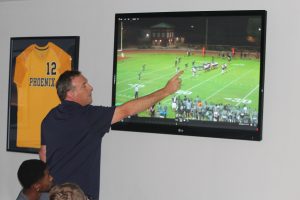- Slug: Pflugrad Phoenix College, 1,400 words
- Photos available
By ERIC NEWMAN
Cronkite News
PHOENIX — Though the Phoenix College football staff resists the name “Last Chance U,” it feels that way at times for Robin Pflugrad.
Five-plus years ago, he was one of the hottest coaching names in the country, a candidate for the Eddie Robinson Award as the nation’s top FCS coach after leading Montana into the semifinals of the playoffs.
Today the former Arizona State assistant is running a football program with an entirely-too-low budget, a makeshift practice field with assembled PVC pipes as goal posts, and a need to move the offices to avoid shooting threats from those cut from the roster.
“Emotionally it was devastating,” Pflugrad said about struggling to find a job after Montana.
What happened? Following a standout 2011 season when the Grizzlies went 11-3, Pflugrad and Montana athletic director Jim O’Day were fired after the university was under a microscope for a number of sexual assaults, including several football players. Among those accused was quarterback Jordan Johnson, whom Pflugrad described publically at the time as a person of “tremendous moral fiber,” and who was later acquitted of charges.
After being fired, Pflugrad said he was essentially black-balled from coaching positions, due to reputational damage that his release brought.
While O’Day was able to parlay his relationships he had created throughout his time in Montana into a successful consulting business, essentially bouncing back quickly into a career, the same was not the case immediately for Pflugrad.
“When his name every came up for a job, presidents were reluctant to approve hiring someone whose name had even been included in a situation where situation assault was listed, regardless of the outcome,” O’Day said.
Though Pflugrad said he was proud to defend Johnson, he thought a series of negative headlines and news coverage left his resume “on a different stack” when he applied for coaching positions around the country. Even with letters of recommendation from former university president Royce Engstrom and Missoula chief administrative officer Janet Stevens Donahue, he could not find a job on the sidelines.
Johnson’s accuser, who went public with her story on “60 Minutes” in 2014, did not respond to an interview request.
“I never thought in my wildest dreams that would occur,” Pflugrad said. “I’ve applied for many jobs, head coaching jobs, coordinator jobs, even at levels much lower than Montana that I never even got responses back for.”
Opportunity came when Dan Cozzetto resigned from the Bears’ head role in early July to join the staff at Oregon State. Pflugrad took on the interim job after signing on as an assistant in 2015. Phoenix College athletic director Samantha Ezell said that based on his early offensive impact, the school had little hesitation in promoting him for the time being.
After amassing an impressive coaching career, assisting at multiple Division I programs and a spot as the head coach at Montana, Phoenix College, at the junior college level, could be seen as a step down.
In fact, Pflugrad said former coaching colleagues and friends asked him why he was taking a position in Phoenix, calling it “career suicide.”
However, to maintain a spot in the college coaching ranks, he may not have had another option than the football team known to take in many athletes with checkered pasts that could not play and succeed at other programs.
Between his time at Montana and Phoenix, with a brief stop at Weber State in Utah, Pflugrad had plenty of time to think about his firing and compare his situation with that of coaches at other programs amid scandals at their universities.
“Sometimes I sit back and almost smile to myself and go, ‘Well, how did he keep his job, or how did she keep her job?’ and ironically sometimes it’s just who’s in the leadership role at a certain time at your career and your life,” he said.
Now, trying to move on from his tribulations, his main goal is to be a mentor to a number of students that have faced their own personal issues in their short football careers.
He said that, after joining the staff, a number of players were homeless, living in the school locker rooms until they were removed and struggling to just find food to eat before games.
With players needing direction, the goal, he said, is to try to get them into four-year schools, hopefully with scholarships and a chance at a bachelor’s degree.
“That’s not going to pay the rent for you, but really it’s going to make you feel good about yourself and your future, and really about doing the right things in life,” he said.
The message has resounded with players.
“Our coaches are always telling us they’re always trying to get us out of here,” receiver Matt Mitchell said.
Now as the head man at Phoenix College, just as his players aspire to make their way onto bigger teams, his own professional goal could be looked at the same way.
Being on an upward trajectory in the coaching ranks, with decades of experience at high-level programs, he said that he would not be opposed to working his way back into bigger schools, but is more focused on his current role.
Also, as history has shown for Pflugrad, football coaching jobs can change in an instant.
“You never have a very good clue where it’s going to end up, where your career is going to end up. So, I don’t think you can ever really say ‘yes’ or ‘no’ to any opportunity until it comes,” he said.
At the junior college level, and specifically at Phoenix College, there are new challenges to overcome, and newly-developed skills to add to his coaching resume, including trials not football-related.
Where some of the programs in Pflugrad’s past drew exorbitant sums of money, the Bears must scrap and claw at every opportunity just to have enough money for a pregame meal. While a school like Oregon, which he assisted at, debuts a new uniform nearly every game, Phoenix College struggled just to afford new helmets after 22 were deemed unplayable and the team’s gold uniform set simply does not have enough numbers to accommodate the whole team.
Unrelated to money issues, which take up a significant amount of Pflugrad’s time and effort, managing the academic and professional lives of 90 to 95 players and a full staff of assistants, most of whom have other full-time jobs, constitutes a significant portion of time before the team can even get into football strategy.
Amid the difficulties coaching a team that had won just a single game in three seasons before 2016, he has to make sure that players are eligible to play, going to classes and passing courses with reasonable credit loads, as well as staying out of trouble.
Also, with players coming and going in just two-year periods, Pflugrad is tasked with a rebuild nearly every year, something he did not have to deal with in his four-year university experiences.
“One thing that I’ve come to know is the amount of respect I have now for the junior college ranks, especially in Maricopa County, what we all go through to put our products on the field. It’s a daily arms race trying to get things going,” he said.
Athletic director Ezell said that respect also exists between Pflugrad and the program, Come the end of the season, she said there is no reason he will not be considered one of the main players in the mix for the permanent head coaching job moving forward.
“I think his overall impact has been extremely positive to our program,” she said. “He’s an excellent offensive coach, and certainly that’s something that when coach Cozzetto was here, we improved on, and he continued to improve that for us. His demeanor is extremely professional and calm and respectful of players which I appreciate.”
Despite recruiting struggles, with schools like Mesa and Scottsdale Community College plucking a lot of the local talent, there are still some talented players walking through the doors at Phoenix College.
One player, defensive lineman Jaron Green, who walked on and is now a second-year starter on the Bears, lives the essence of putting one’s head down and hustling.
“You just have got to be patient and work your way up. Show them how much you’ve got,” he said.
For Pflugrad, chasing success in the inconsistent career path that is college football coaching, with plenty of bumps in the road, the key is moving forward.
“I felt that we’d been hit right in the mouth, so how do we respond? You keep marching. You really don’t have a choice.”

